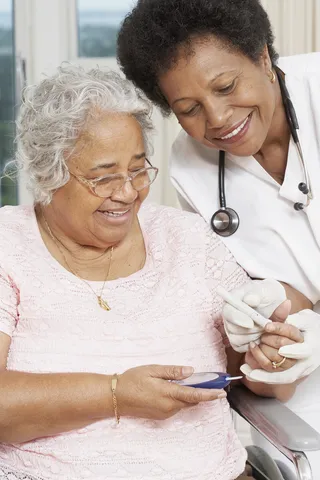Diabetes: What You Need to Know About “The Sugar”
How diabetes impacts blood sugar and African-Americans.

1 / 10
Diabetes: What You Need to Know About “The Sugar” - November just isn’t about Thanksgiving and football, it’s also National Diabetes Awareness Month. Learn more about how this disease impacts your blood sugar, how it affects African-Americans and what you can do to prevent it. —Kellee Terrell(Photo: Courtesy of American Diabetes Association)

2 / 10
What Is Diabetes? - Diabetes is when a person has high blood glucose (blood sugar), either because the body doesn’t properly produce insulin (the enzyme that break the sugar down) or because the body's cells do not respond properly to insulin, or sometimes both, Medical News Today writes. (Photo: Laguna Design/Getty Images)

3 / 10
Warning Signs of Diabetes - Folks with high blood sugar may have to urinate a lot or experience extreme thirst and hunger. Other signs include tingling in their hands and feet, blurred vision, rapid weight loss or weight gain, frequent yeast infections, cuts healing slower than normal and frequent gum disease.(Photo: Geri Lavrov/Getty Images)

4 / 10
Types of Diabetes - There are three forms of diabetes. Type I usually occurs in childhood or teenage years and is when the body does not produce any insulin. Type II happens in 90 percent of diabetes cases around the world and is when the body doesn’t produce enough insulin or the body doesn’t respond well to the insulin. Gestational diabetes occurs among pregnant women — even if they never had diabetes prior. (Photo: Peter Dazeley/Getty Images)

5 / 10
How Common Is It? - In general, diabetes affects almost 25.8 million Americans with 7 million unaware that they have it. The American Diabetes Association estimates that a whopping 79 million Americans have prediabetes. Prediabetes is when your blood sugar levels are higher than normal, but not high enough to be diagnosed with diabetes. (Photo: Godfried Edelman/Getty Images)
ADVERTISEMENT

6 / 10
African-Americans and Diabetes - It’s not a secret that we disproportionately are diagnosed with diabetes — an estimated 4.7 million of us suffer from it. Fifteen percent of all African-Americans who are 20 and older have diabetes; 25 percent of African-Americans between the ages of 65 and 74 have diabetes; and 25 percent of African-American women over 55 have diabetes. (Photo: Blend Images Rolf Bruderer/Getty Images)
Photo By Photo: Blend Images Rolf Bruderer/Getty Images

7 / 10
Diabetes’ Complications - Diabetes can lead to other serious complications such as heart disease, stroke, kidney disease, blindness, amputations, nerve damage and even death. African-Americans are four times more likely to have limbs amputated due to diabetes than whites. (Photo: Image Source/Getty Images)

8 / 10
What Causes Type II Diabetes? - Diabetes has been linked to obesity/being overweight, having a lot of belly fat, drinking sugary sodas and drinks, low testosterone levels in men and sedentary living. Also, getting older increases our risk for diabetes, too. (Photo: Allison Joyce/Getty Images)

9 / 10
Treatment for Diabetes - While the disease is common, the treatment differs from person to person. Some people may have to check their blood sugar by pricking their finger. In terms of medication, some people inject insulin, while others may take pills to manage their diabetes. Read more about treatment here.(Photo: Mark Hatfield/Getty Images)
